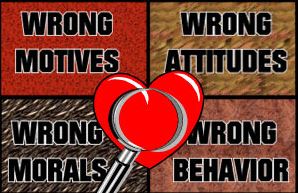Beginning at verse 15 of chapter 1, Paul instructs the Philippians regarding many who preach about Christ, but do so from wrong motives. There is some disagreement on the order of verses 15, 16, and 17. If you compare  the KJV with the NASB (and most other translations) you’ll see how verses 16 and 17 have been reversed. But regardless of what order the verses appear, these three verses give six wrong motives for professing Christ. In thinking about these motives I tried to compare them with the professing religious people in churches today. I think these motives are alive and well. Honestly, I hate it that I still see myself in some of these motives. Check these out and see if you see yourself in anyway in these motives.
the KJV with the NASB (and most other translations) you’ll see how verses 16 and 17 have been reversed. But regardless of what order the verses appear, these three verses give six wrong motives for professing Christ. In thinking about these motives I tried to compare them with the professing religious people in churches today. I think these motives are alive and well. Honestly, I hate it that I still see myself in some of these motives. Check these out and see if you see yourself in anyway in these motives.
The first one is envy. Being Jealous of what Paul had accomplished, these preachers were motivated from a competitive spirit. Religious people today are often motivated from a form of “envy” that drives them to do good things in order to outdo someone else. The second motive is intimately connected to the first. Strife is always a result of envy and jealousy. This truly raises its ugly head in churches today. It was also the main sin which caused the party divisions within the church at Corinth (1 Cor. 1:11, “contentions”). Gromacki explains; “strife is caused when people argue over the way a person words his theological position: ‘He just doesn’t say it the way I want him to say it.’ Strife results when Christians choose to follow certain leaders to the neglect of others (1 Cor. 3:3). It is mere carnality when men respond to disagreement like unsaved persons.”
The third wrong motive Paul points out is “contention.” It’s similar to strife but the Greek words, although related because they are based on the same Greek Stem, are different. They are two separate works of the flesh recorded in Galatians 5:20; strife and divisions. Envy brings strife, strife brings divisions. In Church today many people chose a position and us it as a line in the sand that separates their group from others. The fourth bad motive is “impure” or “insincere.” They were religious because it enhanced their reputation not because of true love for God. The fifth wrong motive mentioned is a form of “affliction.” Their jealousy moved beyond competition but to actually wishing harm to their opponent. They sought to hurt Paul while he was imprisoned. They thought that when Paul heard how good they were doing, he’d become jealous and envious also. Instead Paul rejoiced over their successes. The word “affliction” means “friction.” It carries a vivid image of the painful rubbing of the iron chains against a prisoner’s arms and legs. Finally, the last motive is hard to translate, but basically it refers to people who use religion as a cloak for their sins. No one is perfect except religious people. When people agree that “all have sinned” and then demand their opinions as the only acceptable one, they are throwing up a cloak to protect themselves.